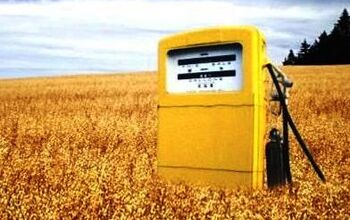NYT: End Tariffs on Brazilian Ethanol
But my God, does Roger Cohen take his time getting to the point. Before the New York Times op ed writer argues for your elected representatives to allow cheap[er] Brazilian ethanol into the U.S., Cohen attempts to entertain us with a discussion of national "re-branding." He begins with the most elliptical lead I've ever read. "Perhaps there’s something to treadmill wisdom. We’re all so narrow-band these days, using the vast resources of broadband to direct ourselves into a chosen news and ideological tunnel. Polarized pluralism defines us." Translation: Cohen was running on a treadmill (geddit?), watching an unknown news channel (broadband) when he fell into a reverie about his Brazilian exile, when the country's economy was almost as hyper-inflated as his prose. And then he thought, wow! "Energy is the country’s new brand." I'm thinking Brazil needs something a bit sexier, but the point– yes! the point!– is corn ethanol bad; sugar cane ethanol, good. "Sugar cane is not a staple. It’s eight times more productive than corn. It grows year round. It must be processed fast, so CO2-spewing transport to distant ethanol plants is impossible (unlike for corn)." The environmental impact of shipping Brazilian ethanol, pathetic workers' wages and the deforestation be damned. See? That wasn't so hard, was it?
More by Robert Farago


































Comments
Join the conversation
Just got back from a long trip from California, up through Oregon, across Idaho, to Wyoming. Driving from Idaho Falls up to West Yellowstone around the park for several days and back down to Idaho Falls, I averaged 32 mpg on non-ethanol fuel. On my way back to Boise, I made the mistake of stopping at a different gas station in Idaho Falls and got E10 gas. My gas mileage from Idaho Falls to Mt. Home (just east of Boise) was just a hair over 26 mpg. This did include a short side trip into Twin Falls, but still, it was almost entirely highway driving and actually with a slight elevation loss. I realize it's anecdotal, but it certainly seems to indicate that the use of E10 fuel results in a greater than 10% loss of fuel efficiency for my car. So, I actually use more petrol when you mix it with ethanol than if I were just using it straight. Ain't ethanol great! (for corn farmers).
Given that the western world is suffering from an obesity crisis, it should be mandatory to turn all sugar cane into ethanol, and ban the use of sugar in food. (After a few weeks without sugar you stop craving it.) The cry will be, "Stop eating my fuel, fatso!"
Re: 6 mpg loss with E10. Let's see. If that were true, then with E85 the loss would be about 8.5 x 6 or 51 mpg.. Your car would run in reverse on E85! Somebody is making a mistake or making things up. Perhaps you were driving faster or going up hill. No way can a 10 percent ethanol blend cause an 18.75 percent decline in mileage unless someone poked a hole in your gas tank. I have been using E10 for over 20 years and never experienced such a loss of mpg in any of my cars or trucks. Even with E85 compared to E10 in my flex fuel Ranger the loss is only in the area of 20 percent. And lately E85 locally is priced more than 20 percent below E10. So on price per mile it is cheaper.
Itwas a roundtrip with non-oxygenated fuel, and as I pointed out in my first post, I went down in elevation on the portion of the trip using E10. I admit to approximately 30 miles of city driving on the E10 tank (out of 300 total miles), though I also had stops and slow and go driving while in Yellowstone with plenty of up and down driving. I don't know why the mileage was so much worse with the E10 gas blend, but I am being completely honest about it. I have also experienced this phenomenon to a lesser degree in the past where I would have a 15% increase in mileage while driving on non-oxygenated fuel in Oregon versus the California gas that was in my tank when I started out, and that was seen over a number of cars and 10,000's of miles over the past several years. I'm not certain, but I believe that Oregon not using oxygenates across the board as well now.